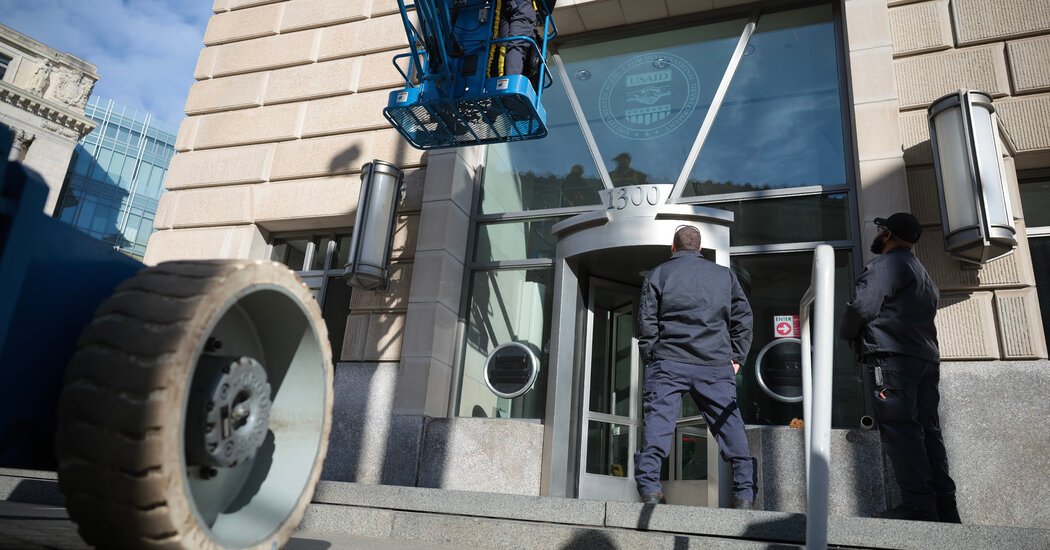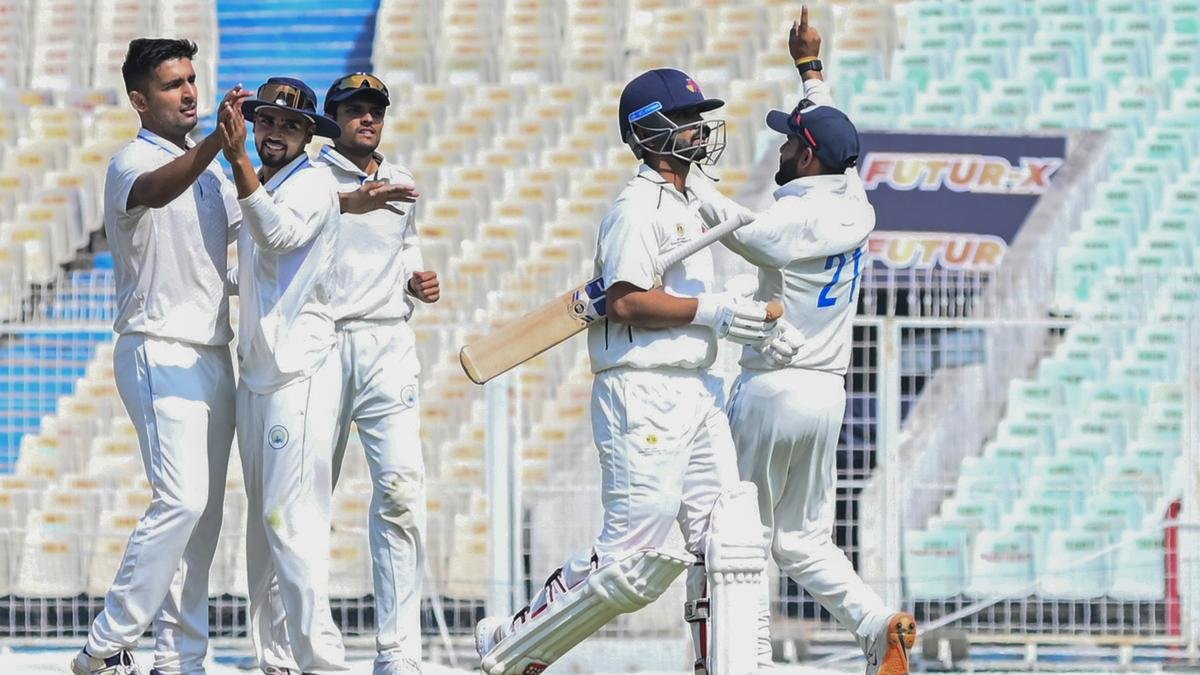With Aid Cutoff, Trump Severs a Lifeline for Millions
Funds from the world’s richest nation once flowed from the largest global aid agency to an intricate network of small, medium and large organizations that delivered aid: H.I.V. medications for more than 20 million people; nutrition supplements for starving children; support for refugees, orphaned children and women battered by violence.
Now, that network is unraveling. The Trump administration froze foreign aid for 90 days and has planned to gut the U.S. Agency for International Development to just 5 percent of its work force, although a federal judge paused the plan on Friday. Given wars and strapped economies, other governments or philanthropies are unlikely to make up for the shortfall, and recipient nations are too hamstrung by debt to manage on their own.
Even the largest organizations are unlikely to emerge unscathed. In interviews, more than 25 aid workers, former U.S.A.I.D. employees and officials from aid organizations described a system thrown into mass confusion and chaos.
A tower of blocks may take hours to build, but “you pull one of those blocks out and it collapses,” said Mitchell Warren, executive director of the H.I.V. prevention organization AVAC, which relied on U.S.A.I.D. for 38 percent of its funding.
“You’ve gotten rid of all of the staff, all of the institutional memory, all of the trust and confidence, not only in the United States but in the dozens of countries in which U.S.A.I.D. works,” Mr. Warren said. “Those things have taken decades to build up but two weeks to destroy.”
Small organizations, some with as few as 10 employees, have folded. Some midsize organizations have furloughed up to 80 percent of their employees. Even large organizations — including Catholic Relief Services and FHI 360, among the biggest recipients of U.S.A.I.D. funding — have announced large layoffs or furloughs.
In one survey, about 1 in 4 nonprofits said they might last a month; more than half said they had enough reserves to survive for three months at most.
The damage is compounded by President Trump’s announcement that the United States would withdraw from the World Health Organization, forcing its leaders to announce cost-cutting measures of their own.
Global health experts said that the future suddenly looked uncertain, even dystopian, and struggled to articulate alternatives.
“We are quite clear that the future looks different,” said Christine Stegling, a deputy executive director at UNAIDS, the United Nations’ H.I.V. division. But “none of us yet has a real picture of what that means.”
The damage extends not just to the health of people abroad but to Americans and American businesses. Along with the roughly 100,000 positions cut overseas, an estimated 52,000 Americans in 42 states have lost their jobs.
The global health care supply chain market was valued at nearly $3 billion in 2023 and was expected to grow. Each year, about $2 billion in American agricultural products were purchased as food aid. The abrupt halt risks more than $450 million worth of corn, lentils, rice and other commodities that are in transit or in warehouses and ports.
“The economic impact of this is going to be astounding to people’s lives and businesses,” said Lisa Hilmi, executive director of CORE group, a consortium of large global health practitioners.
Ms. Hilmi, who worked as a nurse in many conflict and disaster zones, said that a lack of health services could drive poor health, malnutrition, epidemics, civil unrest and “a much broader meltdown of society across the world.”
“If America is the biggest superpower, then we need to act like it,” she said. “And part of that is acting with humanity.”
‘Dizzying chaos’
A week after the aid was paused, Secretary of State Marco Rubio issued a waiver for lifesaving humanitarian assistance and medications. But stop-work orders for some programs, including food assistance, followed even after the waiver’s announcement.
Last week, one large organization got the go-ahead for some of its programs. But later that same day the Trump administration placed dozens of U.S.A.I.D. officers on leave, leaving the organization wondering whether the division that issued the waiver was still a viable entity and the officer who wrote the notice was still employed.
“It’s another example of the dizzying chaos that this administration has inflicted on us,” said a senior official at the organization.
The leaders of most organizations that depend on U.S.A.I.D. funding would not speak on the record, fearing retaliation from the Trump administration.
Even when organizations have received approvals to continue, no money has flowed. One large organization received less than 5 percent of its expected budget for the period, but others have received nothing.
“I obviously welcome that the secretary approved a waiver and put a post on the internet, but we cannot pay our bills with the post,” a senior official at a large organization said of Mr. Rubio.
Some groups feel morally obligated to continue to provide lifesaving services, hoping that they will eventually be reimbursed. But with dozens of small organizations shuttering by the day, damage to some of the world’s most vulnerable groups is accruing, some experts warned.
The ecosystem of global health is so closely interwoven that the pause has frozen the work even of organizations that receive no money from the U.S. government.
The nonprofit IPAS works with hundreds of organizations in dozens of countries to provide access to contraception, abortion and other reproductive health services. Many of the clinics have shuttered, some permanently, said Anu Kumar, the organization’s president.
The speed of the disruption did not allow clinics time to make contingency plans or taper their dependence on the funding, she said, adding, “This definitely has a ripple effect.”
After one week of the freeze, more than 900,000 women and girls will have been denied reproductive care, a figure that will grow to 11.7 million over the 90-day pause, according to the Guttmacher Institute. “That’s more than the entire population of North Carolina,” Dr. Kumar said.
As a result, the institute estimated, 4.2 million girls and women will experience unintended pregnancies, and 8,340 will die from complications during pregnancy and childbirth.
Many H.I.V. programs were focused on “key populations” at highest risk, including transgender people and men who have sex with men, who are marginalized and even criminalized in some countries.
In Uganda, for instance, where a harsh anti-gay law can carry the death penalty for consensual homosexual activity for people with H.I.V., nonprofit groups funded by the United States have been crucial sources of financial and medical support.
“It’s something every American should be proud about, but I don’t think they know it,” said Kenneth Mwehonge, executive director of the Coalition for Health Promotion and Social Development, which monitors the quality of other H.I.V. programs in Uganda.
“I don’t think they know how much they’ve contributed and the lives they’ve saved, and they don’t celebrate it enough,” he said. His organization has had to let go of 140 full-time staff members and community workers.
Childhood immunizations, malaria prevention and treatment and malnutrition programs are also stalled. So are programs on education, economic empowerment, preventive health services and family planning.
“This is a perfect storm for poor health outcomes, no getting around it,” said Elisha Dunn-Georgiou, executive director of the Global Health Council, a membership organization of health groups.
Some U.S.A.I.D.-funded organizations provided clean water and sanitation, particularly for refugee populations. Others helped governments protect against diseases like polio and measles in conflict zones and among nomadic groups. Still others provided expertise in containing outbreaks of dangerous pathogens like Ebola and Marburg, which are smoldering in Uganda and Tanzania.
Any of these threats, if not contained, could easily cross borders and land on America’s shores, said Rebecca Wolfe, who worked at the U.S.A.I.D.-funded nonprofit Mercy Corps for 15 years and is now a development expert at the University of Chicago.
The world “is so interconnected, and to try to divide it into ‘America first’ and the rest no longer works in today’s age,” she said.
‘It feels like grief’
Some U.S.A.I.D. employees and aid organizations said that the sudden unplugging of funding was antithetical to the goal: helping countries become independent enough to care for their own citizens.
In the past few years, U.S.A.I.D. has been working on training midwives, nurses, doctors, laboratories and hospitals to begin to transfer the responsibility.
Self-sufficiency would require small nonprofits at the local level to deliver services, but the smallest organizations are also the least likely to weather the current storm.
“The irony is that their priority in Project 2025 is localizing and moving away from big partners,” said Jeremiah Centrella, former general counsel at Mercy Corps. “But big international partners are the only ones with access to private donors and strong enough balance sheets to get through this.”
It’s unclear what will happen to the tens of thousands of workers who suddenly have no jobs and no industry in which to find one.
In Kenya, Mercy Githinji cared for 100 households in the Kayole neighborhood of Nairobi when the clinic where she worked, run by the U.S.A.I.D. Tumukia Mtoto Project, abruptly closed down. Now Ms. Githinji, a 52-year-old single mother of four daughters, is unsure how she will pay rent or school fees.
The clinic provided medical care but also helped residents with rent money, food and sanitary pads. “Now there’s no check, there’s nothing,” Ms. Githinji said. “It’s very bad. People are suffering.”
Even if aid were to resume next week, clinics and offices have already closed, people have moved, and trust has been broken, some former U.S.A.I.D. employees said.
Others said they were desperately saddened — not for themselves, but for the people they had pledged to serve.
“The only way I have been able to describe it is, it feels like grief,” one former U.S.A.I.D. employee said.
“Our mission is to save lives and alleviate suffering,” she said. “Not having the opportunity to contribute to that, and have it be taken away overnight, arbitrarily, without notice or reason, being called a criminal or radical lunatic, has just been deeply heartbreaking.”
Stephanie Nolen contributed reporting.




Post Comment